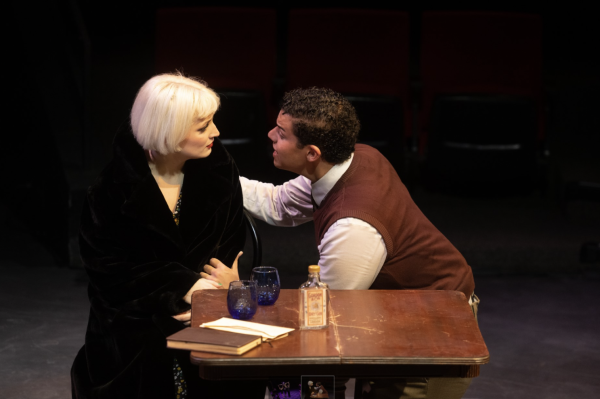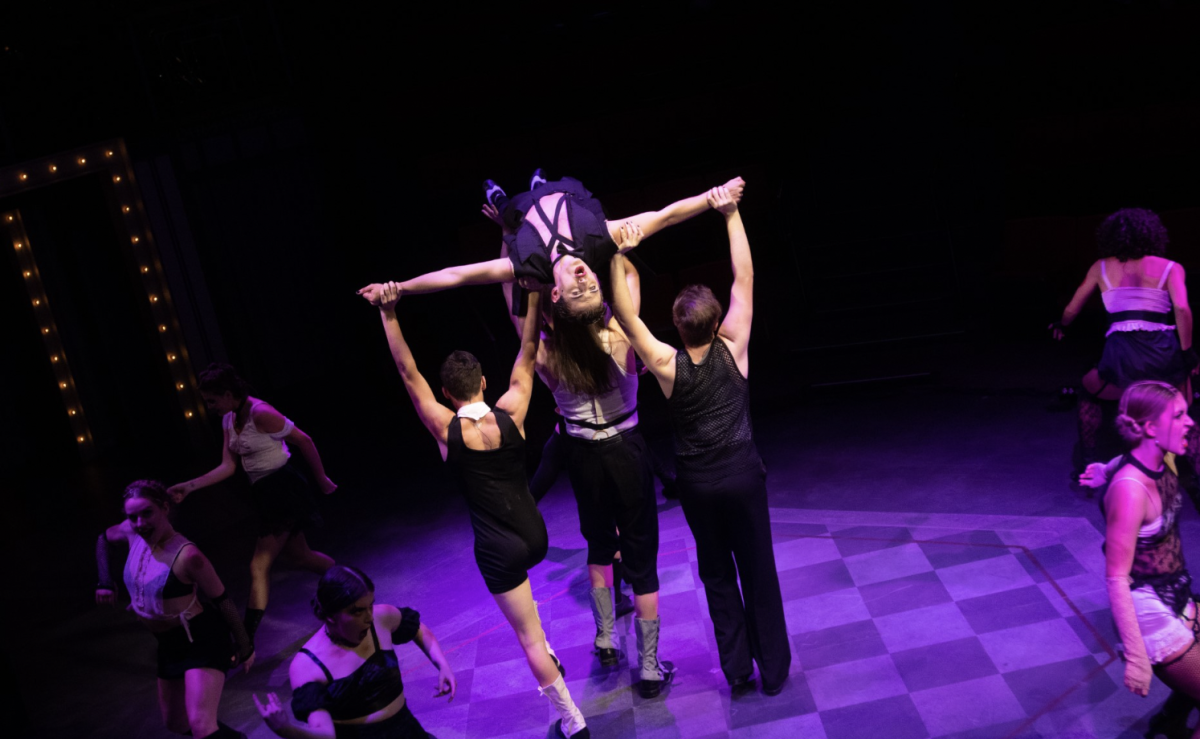Just as you step foot into the Wright-Curtis Theatre, you’re transported into the jazzy and lively Kit Kat Klub, where everyone’s troubles seem to disappear… but not for long.
This intimate nightclub is where the hit musical, “Cabaret,” running at Kent State through Nov. 9, comes to life. It serves as an eerily relevant message for today’s political and social climate.
It’s the twilight of the Jazz Age in 1930s Berlin in the midst of the Nazi Party’s growing presence, and, as the character Clifford Bradshaw puts it in his closing lines, it’s “the end of the world.”
When we meet Bradshaw (played by Anthony Ghali), an American writer in search of inspiration for his next novel, he’s instantly captivated by the carefree, sexual atmosphere of the Kit Kat Klub. He meets English performer Sally Bowles (played by Madison Shannon), who is the club’s leading lady, and they instantly form a connection.
Shannon completely embodies Sally’s complicated character and fiery personality. Through her powerful singing, energetic dancing and timely humor, you begin to see her inner layers shed and how naive and ignorant she is to the world around her.
Sally is a representation of society’s unwillingness to accept the growing and devastating impact of the Nazi Party’s rise in Germany. As the story goes on, her love for Clifford gets more and more complicated as their relationship becomes doomed by Sally’s resistance to change and the political turmoil surrounding them.
The Emcee, or the Master of Ceremonies (played by Dominic Young and Nicholas Bradley), is the core of “Cabaret” and is a symbol of sexual freedom and expression. Serving as the story’s narrator, he breathes life into the Kit Kat Klub through catchy musical numbers, vivacious dancing and lots of heart.
The Emcee is intended to be a more androgynous character, which can be seen by how the character is presented and dresses. In one of his opening lines, he says “life is beautiful” in the nightclub, encouraging people to be themselves and explore the possibilities.
As the musical continues, we meet Fraulein Schneider (played by Rebecca Poole), an older German woman who owns a boarding house and takes in Clifford. She strikes up a romance with Herr Schultz (played by Timothy Culver), an elderly Jewish fruit-shop owner, and their relationship also becomes threatened by the Nazis.
Poole and Culver’s onstage chemistry make it all the more heartbreaking when their characters’ fates are sealed by politics.
Terri Kent, a professor and musical theatre coordinator, directed this vibrant show, and it’s clear that every single moment was carefully thought-out to make the production especially moving.
It’s no exaggeration to say that “Cabaret” is an emotional journey.

The first act has plenty of tender moments and flashy numbers that will make you laugh and cheer. By the second act, you can see how the web of politics and hate has woven itself into the characters’ lives… and they can’t hide anymore.
In the final scene, a helpless and frightened Emcee takes center stage as the cast stacks chairs in front of him, symbolizing a prison cell.
As the orchestra repeats a drumroll, the Emcee emerges behind the chairs and takes off a layer of clothing, revealing a concentration camp prisoner’s uniform marked with an upside down pink triangle, a symbol used to identify imprisoned gay men in the camps.
The cast is met face-to-face with their fate as banners displaying the Nazi flag come crashing down on each wall of the theatre, one by one.
As a last cry for help, the Emcee echoes a familiar phrase but passes the torch off to the audience.
“Tomorrow belongs to you,” he whispers before the cast fades into darkness. These words have stuck with me from the moment I walked out of the theatre.
Today, we’re still seeing hate exist in countless aspects of our society, and our world is also experiencing the devastating effects of war.
“Cabaret” will always be a timeless story that needs to be told over and over again.
When I interviewed Terri Kent toward the end of the show’s rehearsal process, she told me she hopes the show reminds audiences that “we hold tomorrow in our hands.”
Tomorrow absolutely belongs to us. We can never turn our backs on tomorrow.
Aden Graves is an opinion writer. Contact him at [email protected]



















Linda Graves • Nov 8, 2023 at 11:02 am
This is an absolutely amazing and compelling article. New York Times journalism!